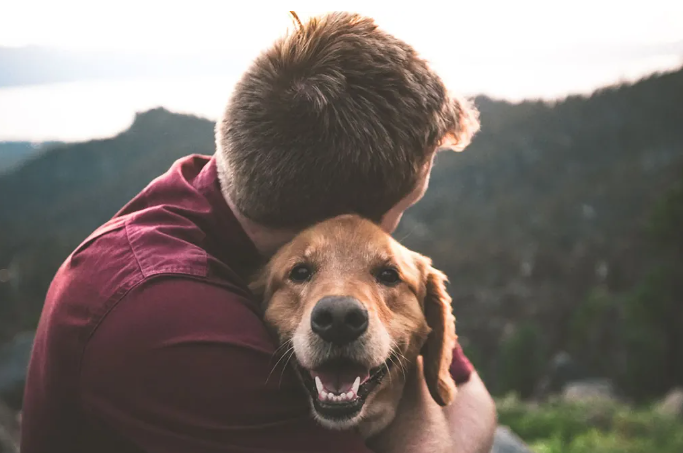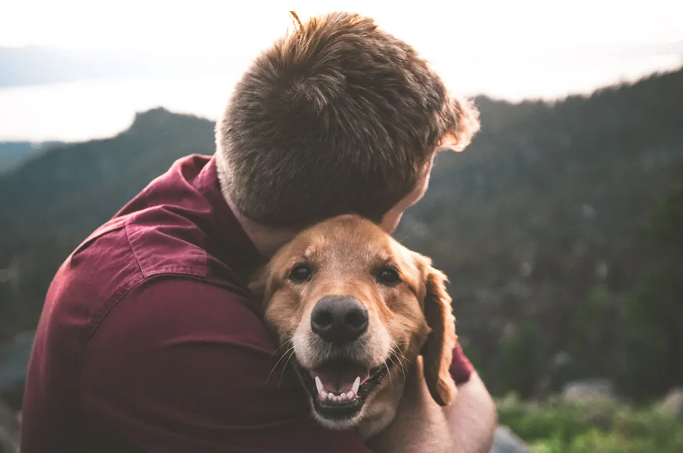Blog
Grieving an Animal Companion


Grieving an Animal Companion
By Jeffrey Richard, Jameson Humane Volunteer
In last month’s blog entry, we explored the question of whether animals experience grief and go through a mourning process when a companion – whether animal or human – passes away. The clear conclusion was that animals certainly do feel grief and mourn the passing of their loved ones; and people need to provide understanding and assistance to our animal companions in finding closure through a grieving process.
This month, we look at the other side of the coin and discuss how we humans should help each other when we mourn the death of our animal companions and other animals under our care.
The Depth of Our Grief for the Loss of a Beloved Animal Should Be Recognized as Natural, Legitimate, and Deserving of Society’s Support
Jameson Humane’s core mission – to promote a world view in which animals are respected and protected from exploitation, consumption, neglect, and mistreatment – recognizes the critical importance of animals to the lives of humans and to the world as a whole. This is demonstrated by looking at the number of animal companions in the United States alone. As of 2018, according to the American Veterinary Medical Association (AVMA):
- More than 48 million households in the U.S. had a total of nearly 77 million dogs
- Nearly 32 million households had a total of more than 58 million cats
- More than 1.5 million households had more than 2.2 million rabbits
- Nearly 900,000 households cared for more than 1.9 million horses as companions
- More than 3.5 million households had around 7.5 million birds.
And the COVID-19 pandemic substantially increased those numbers; by the end of 2020, more than 70 percent of all U.S. households included animal companions.
These statistics, no doubt, reflect the fact that we humans derive great emotional and psychological benefits from the love, comfort and companionship of animals. People enjoy a heightened sense of self-worth in caring for their animals and in turn are comforted when animals reciprocate with affection and support. Those of us who have developed bonds with animals know this to be true. Caring for animals fulfills our need to be needed.
In fact, the bond between animals and their people can sometimes be stronger and certainly less complicated than the relationship with human family members and friends. In a study published in the scientific journal, Evolution and Human Behavior (“Why Do People Love Their Animals?” J. Archer, Dept. of Psychology, University of Central Lancashire, UK), John Archer explains:
“The precise mechanisms that enable animals to elicit caregiving from humans . . . can, in some circumstances, cause pet owners to derive more satisfaction from their pet relationship than those with humans, because they supply a type of unconditional relationship that is usually absent from those with other human beings.”
But there are, of course, trade-offs. Our companion animals are a huge responsibility, requiring us to provide constant attention and care for their emotional, nutritional, and physical needs. And we must take our animals into consideration whenever we make plans – whether such plans entail a few hours away to see a movie or a few weeks to visit far-off lands. Animals can restrict our independence and flexibility in the way we live our lives. But we gladly accept such responsibility and inconvenience in exchange for the love and comfort that they provide. Nothing beats the joy we feel when our animal buddies rush to greet us when we come home to them. And we are immensely satisfied by fulfilling our responsibility to love and nurture our hairy or feathery friends.
However, because of the depth of our bond with our animals, we pay a huge emotional price when the time comes to cope with their deaths. The sad fact is that our animals pass away all too quickly – often only a few short years after they become part of our families. And for many, losing an animal companion is like losing a family member or close friend. See, “What You Can Do to Feel Better After Pet Loss,” PsychCentral.com.
It is often said, and justifiably so, that nothing in life is harder than losing a child. For many people, animals occupy a place in their lives that is the emotional and psychological equivalent to that occupied by children. Thus, the grief they experience in losing an animal that fills that spot in their heart is often beyond measure.
Furthermore, the grief experienced by the animal’s guardian is often accompanied and intensified by feelings of guilt and regret when the guardian was the one who had to make the decision to euthanize their animal companion. Even when euthanasia is the right thing to do in order to put an end to pain and suffering, it is natural for the guardian to question the decision and to be haunted by pangs of guilt.
Unfortunately, society (and individual animal guardians) tend to downplay the seriousness or legitimacy of feelings of grief that arise when an animal dies. And this can make it hard for people to feel free to express their grief and many prolong their mourning. In an article in Psychology Today by Adam Clark, LCSW, “The Cultural Stigma of Pet Loss and Grieving Their Death” (subtitled, “An overview as to why grieving the death of our animals can bring societal judgment), Mr. Clark observes:
“. . . [M]odern-day American culture just isn’t comfortable with the concept of death and dying, especially when it comes to the death of our animals, although that may be slowly changing.
“. . . If a culture naturally avoids the conversation and topic of death, experiencing the grief from someone who has lost a pet can be extra uncomfortable. . . .
“Pet owners who love their animals and consider them members of the family still express ‘I must be crazy for grieving so much’ or question their level of grief, wondering if it is normal to feel the way that they do. In fact, many people experience the death of their pet as more painful than an immediate family member in levels of intensity and duration.”
Where Can People Turn for Support in Mourning the Loss of Animals?
When someone we know loses a family member or close friend, we do what we can to give them emotional support and comfort, and practical support such as food and assistance with arrangements and communications for funeral services and memorials. Hospice services and other health care and civic organizations offer grievance counseling and support groups. But most people don’t know where to turn for similar help with their grief over the death of a companion animal.
“Research has confirmed that for most people, the loss of a dog is, in almost every way, comparable to the loss of a human loved one. Unfortunately, there’s little in our cultural playbook – no grief rituals, no obituary in the local newspaper, no religious service – to help us get through the loss of a pet, which can make us feel more than a bit embarrassed to show too much public grief over our dead dogs.”
(“Why Losing a Dog Can be Harder than Losing a Relative or Friend,”)
The good news is that there seems to be growing recognition that people who lose animals need (and deserve) the same degree of societal support, understanding, and sympathy provided to those who mourn the loss of human loved ones. And there are now more places for us to turn to explore the grieving process, to express our own grief, to be comforted and to comfort others in mourning, and to seek a cathartic outlet. Here are just a few good examples:
Bubbling Well Pet Memorial Park in Napa Valley, California.
In addition to providing a beautiful, serene place for animal burials and memorial ceremonies, Bubbling Well offers online materials and other services to help those who grieve the loss of an animal companion, including aftercare services and a pet compassion careline. Bubbling Well’s online support guide, “Coping with the Loss of a Companion Animal,” is a good source of information and suggestions for dealing with the grief that accompanies loss of companion animals.
- The Pet Memorial Project of the Harmony Fund
The Harmony Fund is an international animal rescue charity. Their Pet Memorial Project maintains an online “Pet Loss Support Center”. Those materials include numerous videos and articles that provide excellent guidance. The videos include “Coping with Pet Grief and Loss,” “I Miss You,” “You Are Forgiven,” and “It’s Okay to be Sad,” among others. The written articles include “How to Deal With the Loss of a Pet,” “How to Bury a Pet,” and “6 Ways to Help a Friend Whose Pet Died.”
- The California Veterinary Medical Association (CVMA)
The CVMA has published on its website a lengthy list of support groups for pet-mourners throughout California. The site also includes the following referrals to additional resources, among others:
- An individual grief counselor, Lois Mark, LCSW, loismark.com
- Moderated chat rooms for pet loss and anticipatory grief, aplb.org
- Virtual candle lighting ceremonies at 7 p.m. each Monday, petloss.com
Nikki Hospice Foundation for Animals’ help line, 707-557-8595
- Best Friends Animal Society (BFAS)
BFAS is a “no-kill” animal sanctuary located in Utah, which was founded in 1984, and which has developed a nationwide network of similar sanctuaries and lifesaving centers. BFAS has put together an excellent set of resources to assist people in coping with the passing of their companion animals. Among a variety of other helpful materials, the BFAS webpages include:
- Articles regarding coping with the loss of an animal companion, mourning the loss during the holidays, and animal euthanasia
- Links to hotlines, support groups, a network of veterinarians who help people copy with end-of-life care for their animals, and a platform for those in mourning to write and share letters expressing their grief
- Videos to assist in the grieving process
Jameson Humane Is Here to Help and Invites Your Thoughts and Suggestions as to How Jameson Can Support People in Coping With the Loss of Animals Under Their Care
Jameson Humane takes in many animals that might otherwise face premature euthanasia. But the decision to humanely euthanize is often the appropriate course for the sake of the animal. Animal guardians who face this sad step are invited to contact Jameson Humane for a list of veterinarians who make house calls for euthanasia to make the process as personal and comfortable for both the animal and the guardian as possible. Please contact Monica Stevens at Monica@JamesonHumane.org. Please visit our Grief Support Page for more resources.
